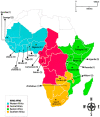Education and Awareness on Antimicrobial Resistance in the WHO African Region: A Systematic Review
- PMID: 37998815
- PMCID: PMC10669252
- DOI: 10.3390/antibiotics12111613
Education and Awareness on Antimicrobial Resistance in the WHO African Region: A Systematic Review
Abstract
This review documents the status of AMR education and awareness in the WHO African region, as well as specific initiatives by its member states in implementing education and awareness interventions, as a strategic objective of the Global Action Plan on AMR, i.e., improve knowledge and understanding on AMR through effective communication, education, and training. A systematic search was conducted in Google Scholar, PubMed, and African Journals Online Library according to Preferred Reporting Items for Systematic Reviews and Meta-analyses (PRISMA) guidelines, for articles published in English. Retrieval and screening of articles was performed using a structured search protocol following a pre-set inclusion/exclusion criterion. Eighty-five published articles reporting 92 different studies from 19 Member States met inclusion criteria and were included in the final qualitative synthesis. Nigeria (21) and Ethiopia (16) had most of the studies, while the rest were distributed across the remaining 17 Member States. The majority of the articles were on knowledge, attitude, and practices with regard to AMR and antimicrobial use and most of them documented a general lack and suboptimal knowledge, poor attitude and practices, and widespread self-medication. This review shows low levels of knowledge of AMR coupled with extensive misuse of antimicrobial medicines by different target audiences. These findings underscore the urgent need for enhanced and context-specific educational and positive behavioural change interventions.
Keywords: antimicrobial resistance; antimicrobial stewardship; awareness; education; one health; systematic review.
Conflict of interest statement
The authors declare no conflict of interest.
Figures
References
-
- Ten Health Issues WHO Will Tackle This Year. [(accessed on 1 October 2019)]. Available online: https://www.who.int/emergencies/ten-threats-to-global-health-in-2019.
-
- Review on Antimicrobial Resistance. Antimicrobial Resistance: Tackling a Crisis for the Health and Wealth of Nations. 2014. [(accessed on 1 October 2019)]. Available online: http://amrrevieworg/sites/default/files/160525_Final%20paper_with%20cove....
-
- Murray C.J., Ikuta K.S., Sharara F., Swetschinski L., Aguilar G.R., Gray A., Han C., Bisignano C., Rao P., Wool E., et al. Resistance Collaborators. Global burden of bacterial antimicrobial resistance in 2019: A systematic analysis. Lancet. 2022;399:629–655. doi: 10.1016/S0140-6736(21)02724-0. - DOI - PMC - PubMed
-
- WHO . Global Action Plan on Antimicrobial Resistance. World Health Organization; Geneva, Switzerland: 2015.
Publication types
Grants and funding
LinkOut - more resources
Full Text Sources
Miscellaneous



